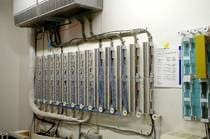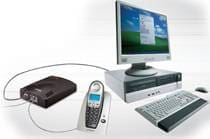Residential Services

A Guide to a Reliable and Efficient Home Network
Bring your home into the 20th century and get all the benefits of the digital age!
Georgia Technical Services (GTS) provides affordable low cost residential wiring and installation of various low voltage technologies such as VOIP, CCTV, home theater , Cat5e/Cat6, network cabling, IT wireless networking and any of your low voltage requirements.
Pre Wiring
Prewiring is the term used when you are either building a new home or remodeling an older home. This is the best time to have your data network installation and other low voltage wiring or cabling done. Having the home ethernet cable installation done at this phase can save you up to 40% of the costs of having it done in the future. It will also make the structured cabling installation much less difficult. .
Post Wiring
“Post-wiring refers to the stage where a house is constructed and fully finished. Undertaking a Cat5e/Cat6 network installation on such a project can be notably arduous and time-consuming. While residential networking installations often come with challenges, rest assured that Georgia Technical Services excels in this realm, evident in our commitment to our one concise slogan:
“Any wire, anywhere, anytime.”
When it comes to wiring your home, whether it’s pre-wiring or post-wiring, opting for a low voltage,structured cabling system is an excellent way to maximize the capabilities of a cutting-edge communications and media wiring setup. This advanced wiring system ensures that all lines and cables converge at a central location, allowing for flexible configuration using various cabling infrastructure technologies such as Closed-circuit TV (CCTV), Intercom, IP Video Surveillance, Home data Network, Sound Systems, Telephone Wiring-Cat3 or Cat5e,Cat6 network and Voice Over IP (VOIP) cabling.
In today’s Internet-driven era, most households possess numerous computers. With Georgia Technical Services, you can have your home wired in a manner that enables all family members to conveniently share a single printer, access the internet, enjoy X-box live, stream videos, and much more through your private home Cat5e/Cat6 wired and or wireless network. Join the modern age by bringing your home into the 20th century and reap the multitude of benefits offered by the digital era! Don’t hesitate to contact GTS today for a complimentary consultation.Having a reliable and efficient home network is crucial in today’s digital age. Whether you work from home, stream movies, or simply browse the internet, a well-wired residential network is essential for seamless connectivity. In this article, we will explore the importance of residential network wiring and provide some tips on how to set up a robust and efficient home network.
First and foremost, let’s understand the significance of proper network wiring. A well-designed network infrastructure ensures that all devices in your home can communicate with each other and access the internet without any interruptions. It eliminates dead zones and ensures consistent signal strength throughout your home. Additionally, a properly wired network minimizes latency, which is crucial for online gaming and streaming high-definition content.
To set up a reliable residential network, start by planning the layout of your home. Identify the areas where you will need network connectivity and determine the best location for your router. Ideally, the router should be placed in a central location to ensure even coverage throughout your home. Avoid placing it near appliances or other electronic devices that may cause interference.
Next, consider the type of wiring you will use. Cat5e and Cat6 Ethernet cables are the most common and reliable choice for residential network wiring. These cables provide fast and stable connections, especially when compared to wireless alternatives. When installing Ethernet cables, make sure to use high-quality cables and connectors to minimize signal loss and interference.
Another important aspect of residential network wiring is the use of network switches. These devices allow you to connect multiple devices to your network using Ethernet cables. By using switches strategically, you can ensure that each device receives sufficient bandwidth for optimal performance. Consider installing switches in areas where you have multiple devices, such as your home office or entertainment center. In addition to Ethernet cables and switches, consider investing in a quality router and modem. These devices act as the backbone of your home network and can significantly impact its performance. Look for routers with features like dual-band support, Quality of Service (QoS) settings, and advanced security features to enhance your network’s capabilities. Lastly, don’t forget about cable management. Proper cable management not only improves the aesthetics of your home but also reduces the risk of cable damage and interference. Use cable clips, ties, and conduits to neatly organize your cables and prevent them from tangling or getting damaged. In conclusion, residential network wiring plays a crucial role in ensuring a reliable and efficient home network. By carefully planning the layout, using high-quality cables and switches, investing in a quality router, and practicing good cable management, you can create a robust network that meets all your connectivity needs. So, Call Georgia technical services to set up your home network correctly, and enjoy seamless connectivity throughout your home.






























